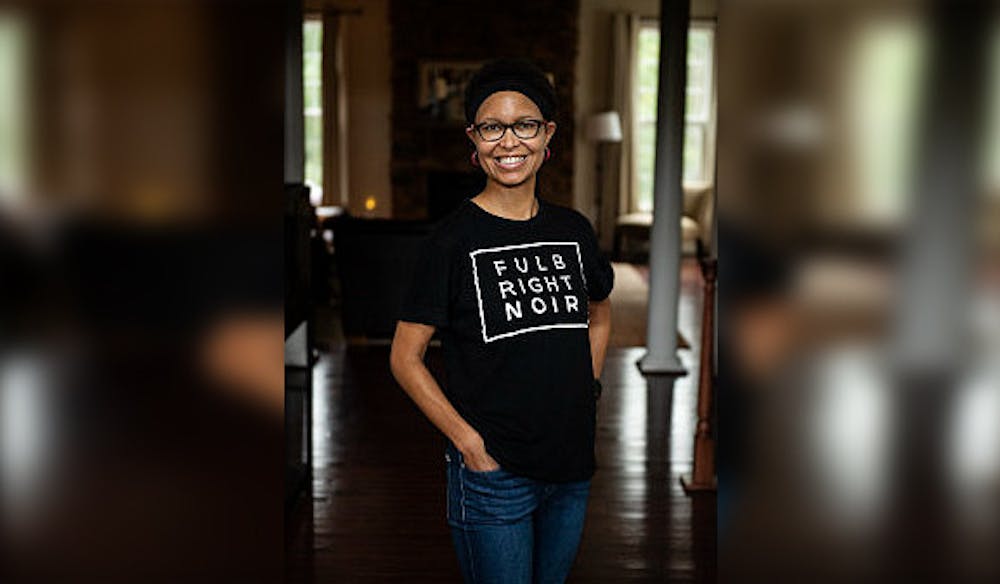IU Global Connections hosted a conversation on international education and inclusivity, led by LaNitra Berger, an associate professor of history and art history at George Mason University and President and Board Chair of NAFSA: Association of International Educators at the Furgeson International Center at 10 a.m., Oct. 9.
During her presentation, Berger, who is also the director of African and African American studies at George Mason University, discussed three important concepts in inclusivity and international education for a call to action: power, comfort and ignorance.
Power, she said, revolves around who has it, who doesn’t and what happens when power changes hands. She used the example of historically Black colleges and universities bringing Jewish refugee scholars to their institutions during World War II. At the beginning of her presentation, Berger discussed how even though the historically Black college administrations had limited resources, they were accepting refugee scholars while the Ivy League schools, which had more resources, rejected visas. The issue, she said, involved visas and how, even when people don’t think they have power, they do.
When students leave college, she said, they should understand systems of power and privilege.
When discussing comfort, Berger used the example of load shedding in South Africa. Because the country’s power system was built only for white people during apartheid, she said, students studying in South Africa need to understand that they won’t have power all day. Load sheading is the planned interruptions of electric supply when demand exceeds supply, according to the website for the city of Johannesburg, South Africa. She also said comfort is a way of asserting privilege that students need to understand. By interrogating these structures, Berger said students will be humbler when studying abroad.
Berger also discussed an experience she had while taking students abroad in South Africa during the Fourth of July. She said the students were given a tour of a monument for mixed-race children that had been taken from their families and adopted by white families during Apartheid while news about children being put in cages in the U.S. was coming out.
The students on the tour, Berger said, were uncomfortable because of the news, the history at the monument and being abroad during a major U.S. holiday, and they had little international experience. The group, Berger said, had to talk about their feelings of discomfort and how to change when they returned home.
Finally, Berger discussed ignorance, and used the example of how a researcher was trying to find out if White South Afrikaners were unaware of how bad apartheid was. Berger said ignorance, was a willful strategy of white supremacy.
“You know enough to know that you don’t want to know anymore,” Berger said.
She also discussed conversations she had with students surrounding attacks on public monuments while in South Africa, like the Cecil Rhodes statue in Cape Town, which had its head removed in 2020 according to the BBC. The conversation about public monuments, she said, hadn’t started in the U.S. and her students didn’t know what to do when they returned home.
After finishing her presentation, Berger opened the discussion to the audience and answered questions about changing students' mindsets, navigating conversations about Diversity, Equity and Inclusion and international studies, global education at home and re-entry experiences.
Grace Sims, a third-year doctoral student in the Doctor of Education, Ed.D., program studying how Black student experiences abroad influence their college experience. Sims said she came to the event because the groups she interns for, the Jane Jorgensen Diversity, Equity and Inclusion internship and international affairs and development and overseas studies, are hoping to explore how philanthropy can be used to address equity gaps in study abroad.
“Knowing that Dr. Berger is the president of NAFSA, knowing how important it is to have representation in study abroad, that's the biggest reason why I came, especially as we're working on this on philanthropy-based project about equity and study abroad,” Sims said. “And so, I'm glad that Dr. Berger touched on some of those points too.”
Sims said she loved Berger’s presentation and liked that she mentioned getting this information into the curriculum because students are already engaging internationally. Sims said she studied Japanese in high school and college but has never been to Japan.
“But in undergrad, I did have a chance to take a class about the culture and history of geishas, and I got to put on a kimono. And so though I've never made it to Japan, it has been reinforced in some of the classes and personal interests, and so I still feel that connection,” Sims said.
Provost Professor of Spanish and Portuguese Deborah Cohn said if students have questions or need connections, they should ask because there are so many different people and offices that want international education to happen for them and are there and willing to support them.
“It can happen here, and it can happen abroad and that is, it is for everybody,” Cohn said.





